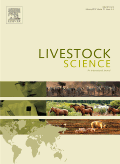
Livestock Science
Scope & Guideline
Pioneering Research for a Sustainable Livestock Future
Introduction
Aims and Scopes
- Livestock Production Systems:
The journal covers a wide range of livestock production systems, including cattle, poultry, sheep, goats, and aquaculture, focusing on optimizing production efficiency and sustainability. - Animal Health and Welfare:
Research on animal health, disease prevention, and welfare practices is a core focus, exploring veterinary science, zoonotic diseases, and the impact of management practices on animal well-being. - Nutrition and Feed Management:
The journal emphasizes studies on animal nutrition, feed composition, and the effects of diet on growth, reproduction, and overall health, including the use of alternative feed sources. - Genetics and Breeding:
There is a strong emphasis on genetic research, including studies on genetic polymorphisms, breeding practices, and the application of biotechnology in livestock improvement. - Socio-Economic Impacts of Livestock:
Understanding the socio-economic aspects of livestock farming, including the challenges and opportunities faced by farmers, is a critical area of research, particularly in developing regions.
Trending and Emerging
- Biotechnology and Genetic Engineering:
The application of CRISPR/Cas9 technology and other biotechnological innovations in livestock genetics is increasingly prominent, reflecting a trend towards precision breeding and genetic improvement. - Sustainable Practices and Climate Change Resilience:
There is a growing emphasis on sustainable livestock practices and the impact of climate change on livestock production, highlighting the need for adaptive strategies in response to environmental challenges. - Alternative Feed Sources:
Research on alternative and sustainable feed sources, including insect meal and plant-based proteins, is on the rise, driven by concerns over conventional feed supply and environmental sustainability. - Health Monitoring Technologies:
The integration of IoT and AI technologies for smart health monitoring of livestock is emerging as a key trend, as farmers seek innovative solutions to enhance animal health and productivity. - Socio-Economic Studies in Livestock Farming:
There is an increasing focus on the socio-economic aspects of livestock farming, particularly in relation to gender roles, market access, and the economic viability of smallholder farming systems.
Declining or Waning
- Traditional Breeding Practices:
Research on traditional breeding practices has seen a decline, possibly due to the increasing interest in modern genetic techniques and biotechnology, which offer more efficient and controlled breeding solutions. - Wildlife-Livestock Interactions:
Studies focusing on the interactions between wildlife and livestock have decreased, likely overshadowed by more pressing concerns in livestock health and management in intensive farming systems. - Historical Livestock Management Practices:
Papers discussing historical or traditional livestock management practices are appearing less frequently, as the journal shifts towards contemporary issues and innovative solutions in livestock science.
Similar Journals
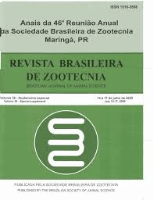
REVISTA BRASILEIRA DE ZOOTECNIA-BRAZILIAN JOURNAL OF ANIMAL SCIENCE
Empowering Knowledge in Brazilian ZootecniaREVISTA BRASILEIRA DE ZOOTECNIA - BRAZILIAN JOURNAL OF ANIMAL SCIENCE is a leading open-access journal published by the esteemed Universidade Federal Viçosa, dedicated to advancing the field of animal science and agricultural research in Brazil and beyond. With an ISSN of 1516-3598 and an E-ISSN of 1806-9290, the journal has been a crucial resource since its inception in 1996, now looking ahead to its continued contribution through 2024. As a Q3-ranked journal in Animal Science and Zoology, it provides a platform for high-quality research, encouraging the dissemination of cutting-edge studies and innovative methodologies. The journal's impact in the scientific community is further reflected in its Scopus ranking within the 46th percentile, evidencing its importance in the global discourse around animal science. For researchers, professionals, and students alike, REVISTA BRASILEIRA DE ZOOTECNIA offers a valuable opportunity to engage with timely, peer-reviewed content and contribute to the advancement of knowledge in animal sciences.
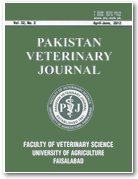
PAKISTAN VETERINARY JOURNAL
Advancing veterinary science for a healthier future.Pakistan Veterinary Journal (ISSN: 0253-8318, E-ISSN: 2074-7764) is a leading peer-reviewed academic journal published by the University of Agriculture, Faculty of Veterinary Science, situated in Faisalabad, Pakistan. Since its inception, the journal has embraced an Open Access policy, facilitating the dissemination of vital research findings to a global audience and enhancing the visibility of veterinary science. With an impressive Q1 ranking in the veterinary miscellaneous category, the journal ranks #27 out of 194 in the veterinary general field according to Scopus, placing it in the top 14% of the discipline. The scope of the journal encompasses a wide array of topics relevant to veterinary medicine, ensuring that it serves as an essential resource for researchers, professionals, and students alike. By providing a platform for high-quality research from 2009 to 2024, the Pakistan Veterinary Journal continues to play a pivotal role in advancing veterinary science, promoting collaboration among scholars, and addressing contemporary challenges in animal health and welfare.
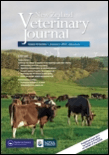
NEW ZEALAND VETERINARY JOURNAL
Innovating veterinary practices for a healthier tomorrow.NEW ZEALAND VETERINARY JOURNAL, published by Taylor & Francis Ltd, stands as a pivotal platform in the realm of veterinary science, contributing significantly to the global discourse on animal health and welfare since its inception in 1952. With an ISSN of 0048-0169 and an E-ISSN of 1176-0710, this journal offers invaluable insights within both the veterinary and general medical fields, currently achieving a commendable Q2 ranking in Veterinary (miscellaneous) and Q3 in Medicine (miscellaneous) for 2023. Its Scopus ranking places it in the 76th percentile among veterinary journals, affirming its high-impact presence in academia. While access to this journal is not open, it maintains an essential role for researchers, professionals, and students aiming to advance their knowledge and contribute to the field of veterinary science. With a commitment to disseminating quality research, NEW ZEALAND VETERINARY JOURNAL enriches the understanding of veterinary practices and enhances ongoing dialogue on critical health issues affecting animals, promoting better outcomes through scientific inquiry.
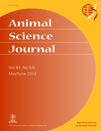
ANIMAL SCIENCE JOURNAL
Pioneering Research in Animal Science and ZoologyAnimal Science Journal, published by Wiley, stands as a premier platform for advancing knowledge in the fields of Agricultural and Biological Sciences, Animal Science and Zoology, and Food Science. With an ISSN of 1344-3941 and an E-ISSN of 1740-0929, this journal not only enjoys a commendable Q2 ranking across multiple categories, reflecting its significance and impact within the academic community, but it also ranks within the top percentiles in terms of Scopus rankings. Operating out of the United Kingdom, the journal covers a broad spectrum of research topics relevant to animal science, encompassing both theoretical insights and practical applications. While it is not an open access journal, it remains an essential resource for researchers and practitioners eager to enhance their understanding of animal sciences, contribute to ongoing debates, and stay abreast of the latest findings from 2003 through 2024. Scholar engagement and innovative research are central to the journal’s objectives, making it an invaluable asset for students, professionals, and academics alike.
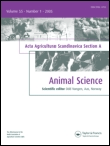
ACTA AGRICULTURAE SCANDINAVICA SECTION A-ANIMAL SCIENCE
Bridging Theory and Practice in Animal ProductionACTA AGRICULTURAE SCANDINAVICA SECTION A-ANIMAL SCIENCE, published by Taylor & Francis AS, offers a vital platform for the dissemination of research in the field of animal science. With an ISSN of 0906-4702 and an E-ISSN of 1651-1972, this esteemed journal is based in the United Kingdom and covers critical studies pertaining to animal biology, production, and welfare. Although it operates under a non-open access model, the journal maintains a commendable position in the academic community, evidenced by its Q3 category ranking in both animal science and food animals for 2023, reflecting a sustained impact in these domains. Covering research from 1992 to 2018 and continuing from 2020 to 2024, the journal provides insights crucial for addressing contemporary issues in livestock production, veterinary sciences, and animal breeding. Researchers, professionals, and students alike will find this journal indispensable for enhancing their understanding and advancing the field of animal sciences.
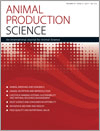
Animal Production Science
Elevating Standards in Animal Science ResearchAnimal Production Science, published by CSIRO PUBLISHING, is a prestigious journal that caters to the fields of Animal Science and Food Science. With an ISSN of 1836-0939 and an E-ISSN of 1836-5787, the journal features high-quality research and reviews that are crucial for advancing the understanding and innovation of animal production systems. Recognized within the Q2 category of both Animal Science and Zoology, and Food Science, as per the 2023 Journal Rankings, Animal Production Science has achieved commendable Scopus rankings, placing it in the 68th and 48th percentiles in its respective categories. With converged years from 2009 to 2024, and an aim to disseminate knowledge that promotes sustainable practices, the journal is pivotal for researchers, professionals, and students devoted to animal production and food security. Exploring topics from livestock management to food quality, the journal offers valuable insights for enhancing productivity while considering welfare and environmental impact. For those seeking accessibility, the journal provides various open access options, encouraging a wider reach of its scholarly articles.

Ankara Universitesi Veteriner Fakultesi Dergisi
Elevating veterinary research to new heights of excellence.Ankara Universitesi Veteriner Fakultesi Dergisi is a prominent academic journal published by ANKARA UNIV, focusing on advancements in veterinary sciences and animal biology. Since its inception, the journal has been committed to disseminating high-quality research, featuring articles that span a variety of topics within veterinary medicine and animal science. With an ISSN of 1300-0861 and an E-ISSN of 1308-2817, this journal provides valuable insights into the latest research developments and trends, making it a critical resource for researchers, professionals, and students in the field. The journal has established itself within the scholarly community, achieving a Q3 rank in Animal Science and Zoology and a Q2 rank in Veterinary (miscellaneous) as of 2023, reflecting its growing relevance and impact. Positioned in Turkey, it serves as a vital platform for both local and international scholars to share innovative findings and foster collaboration. Enhancing its accessibility, the journal's content is available through various academic databases, ensuring that its readership can effortlessly access and engage with cutting-edge research.
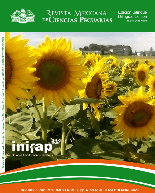
Revista Mexicana de Ciencias Pecuarias
Fostering Collaboration in Veterinary Medicine and ResearchRevista Mexicana de Ciencias Pecuarias, published by INIFAP-CENID PARASITOLOGIA VETERINARIA, is a prominent open-access journal since 2010 that caters to the fields of Animal Science and Veterinary Medicine. Based in Mexico, this journal addresses critical issues in animal health, production, and welfare, making it instrumental for researchers, professionals, and students seeking to advance their knowledge and practices. With an impact factor that reflects its growing influence, particularly in the Q3 quartile rankings in both Animal Science and Zoology as well as Veterinary (Miscellaneous) categories, the journal provides a vital platform for the dissemination of innovative research and findings. Additionally, its Scopus Ranks position highlights its role in publishing significant contributions to the fields of Veterinary Science and Agricultural Biology. The journal fosters a collaborative learning environment through its open-access model, ensuring that valuable insights are accessible to a wide audience. For those committed to enhancing animal well-being and advancing veterinary practices, the Revista Mexicana de Ciencias Pecuarias stands as a key resource through its rigorous peer-reviewed publication process and commitment to scientific excellence.

Applied Animal Science
Exploring the Intersection of Research and Practical ApplicationsApplied Animal Science, published by Elsevier Science Inc, is an esteemed journal that has quickly made its mark in the fields of Animal Science and Food Science since its inception in 2019. With an ISSN of 2590-2873 and an E-ISSN of 2590-2865, this journal has received commendable recognition, achieving a Q2 ranking in both categories as of 2023. Encompassing a broad scope that integrates cutting-edge research and practical applications, Applied Animal Science seeks to disseminate knowledge that advances the well-being of animal systems and food safety. Researchers and professionals in the agricultural and biological sciences benefit from its high-quality articles, which are ranked #152 out of 490 and #200 out of 389 in their respective fields according to Scopus rankings. While currently not open access, the journal remains accessible to a global audience of scholars eager to explore innovative findings and robust methodologies. As it continues to grow through 2024 and beyond, Applied Animal Science aims to be a pivotal platform for fostering knowledge exchange and inspiring future studies in its domain.
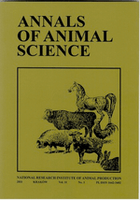
Annals of Animal Science
Driving Excellence in Animal Science StudiesAnnals of Animal Science is a prestigious academic journal, published by Walter de Gruyter GmbH in Germany, specializing in the multifaceted field of Animal Science. With an ISSN of 1642-3402 and an E-ISSN of 2300-8733, this journal is recognized for its high-impact contributions, holding a commendable impact factor that demonstrates its relevance in nurturing quality research. The journal has garnered Q2 rankings in 2023 across various categories including Animal Science and Zoology, Food Animals, and Small Animals. Notably, its Scopus Rankings indicate an elite standing, with the journal placing in the top 10% within its specific fields. Covering converged years from 2008 to 2024, the Annals of Animal Science serves as an essential platform for researchers, professionals, and students to disseminate knowledge and advance studies related to animal health, welfare, and production. The journal also emphasizes open access, promoting broader accessibility to foster collaboration and innovation in Animal Science globally. For those committed to advancing their understanding of veterinary and agricultural sciences, this journal is a vital resource.